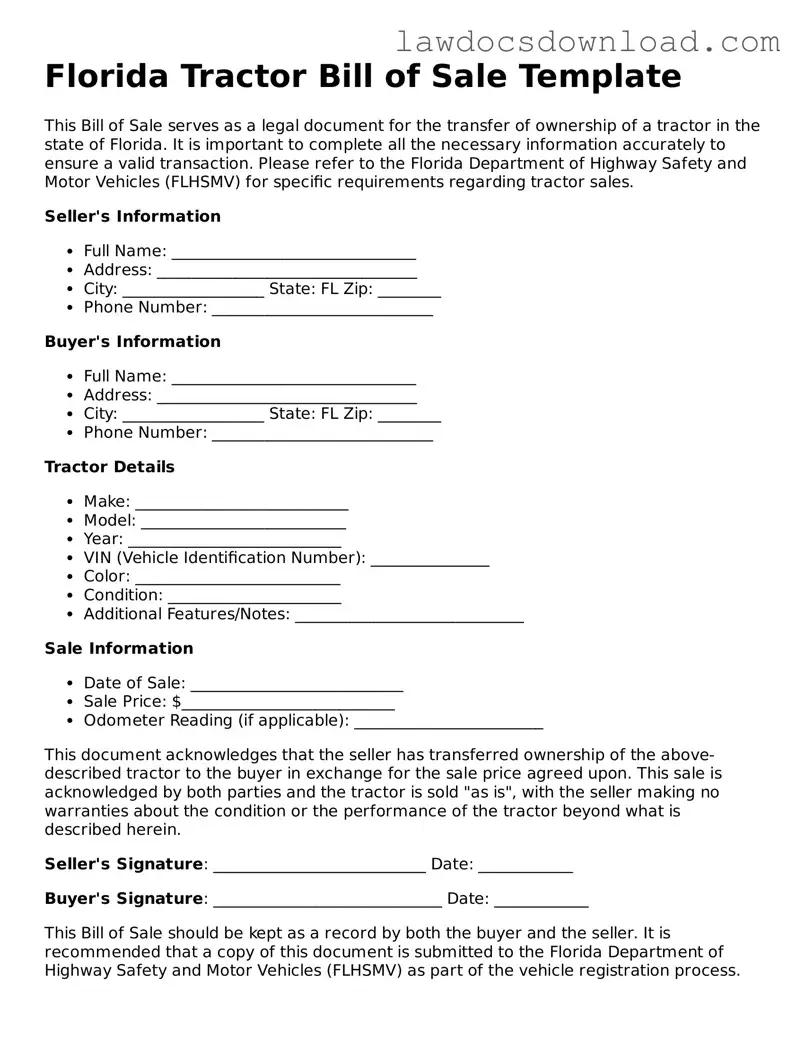A Vehicle Bill of Sale is remarkably similar to a Florida Tractor Bill of Sale in that both serve to document the sale and transfer of ownership of a piece of property. Specifically, a Vehicle Bill of Sale is utilized in transactions involving cars, motorcycles, and boats, detailing the agreement between buyer and seller, the purchase price, and identifying information about the vehicle. This document, like the tractor bill of sale, is crucial for legal protection and may be required for registration purposes.
The General Bill of Sale also bears resemblance to the Florida Tractor Bill of Sale, as it is used to record the sale of various types of personal property such as tools, furniture, and electronics. While it serves a similar purpose of signifying the transfer of ownership and outlining the details of the transaction, the general bill of sale is more versatile, accommodating a wider array of personal property sales.
A Firearm Bill of Sale is another document that parallels the Florida Tractor Bill of Sale in function. This specialized bill of sale is designed for the sale of firearms, specifying the make, model, caliber, and serial number of the firearm, in addition to the personal details of the buyer and seller. It is significant for both legal ownership transfer purposes and for adhering to state and federal regulations concerning firearm sales.
The Equipment Bill of Sale closely relates to the tractor bill of sale, as it specifically documents the sale of machinery and heavy equipment, which may include tractors in a broader sense. This form elaborates on the equipment's condition, sales price, and any warranties or guarantees, ensuring both parties are aware of the terms and conditions of the sale. It is crucial for sales involving construction, agricultural, or industrial equipment.
A Livestock Bill of Sale is used for transactions involving animals, such as cattle, horses, and sheep. Although it serves a different market, the document is similar to a tractor bill of sale because it records a sale, lists the specifics of the animals being sold (including breed and health status), and identifies the buyer and seller. For transactions involving animals, this document is vital for proving ownership and ensuring the terms of the sale are clear.
The Aircraft Bill of Sale resembles the Florida Tractor Bill of Sale in its purpose to document the sale and ownership transfer of an airplane. It includes detailed information about the aircraft, such as the model, serial number, and registration number, alongside the sale conditions. This document is essential for both legal and registration purposes within the aviation industry.
A Business Bill of Sale is pertinent to transactions involving the sale of a business or a significant part of its assets. This document outlines the specifics of the sale, including inventory, intellectual property, and client lists, akin to the tractor bill of sale which lists details pertaining to the sale. It's critical for ensuring a smooth transition of ownership and for tax purposes.
A Mobile Home Bill of Sale is utilized when selling or buying a mobile home, detailing the sale agreement, description of the mobile home, and the details of the parties involved. Though specifically for mobile homes, it shares the common goal with the tractor bill of sale of recording a major transaction to protect both buyer and seller legally and financially.
The Promissory Note can be considered similar to the Florida Tractor Bill of Sale in the aspect of facilitating a transaction. While not a bill of sale itself, a Promissory Note outlines the repayment plan for money borrowed to purchase an item, such as a tractor. It complements a bill of sale by detailing the financial agreement behind the transaction, ensuring the seller receives payment over time.
A Real Estate Purchase Agreement, while primarily focused on the sale of real property rather than personal property, shares similarities with the tractor bill of sale in documenting the terms of a sale. This legal document specifies the purchase price, property description, and conditions of the sale of real estate, ensuring both parties are legally protected throughout the transaction process.

